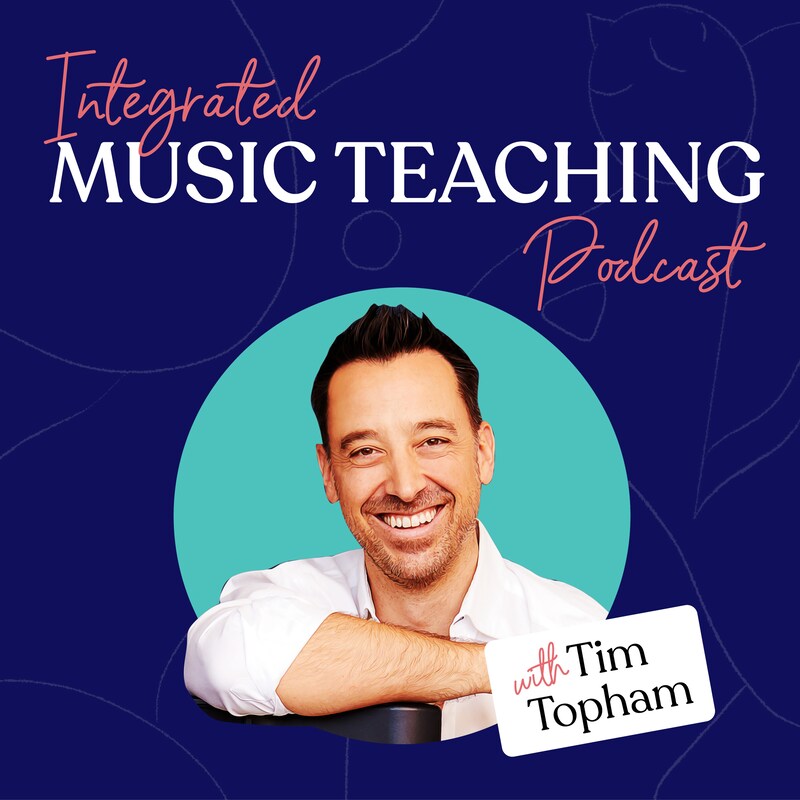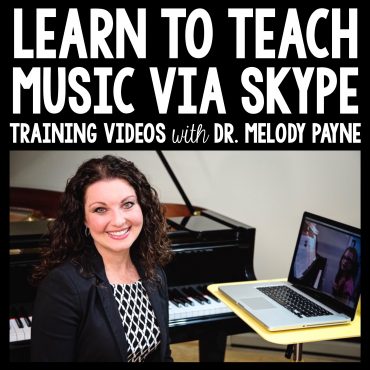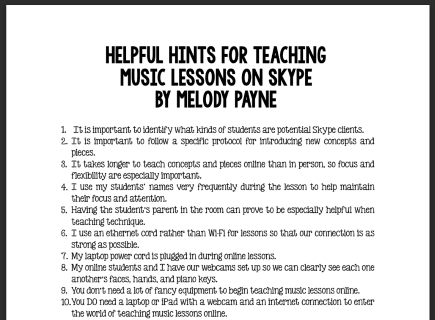
Shownotes
[powerpress]
This week on the podcast we're talking next level online lessons with Mr. Technology himself, Mario Ajero. If you're ready to make your online lessons even more effective with some super clever tech, Mario's your guy.
Mario was a pioneer in the early days of music teaching technology. He has tried and tested the best of these tools to enhance his own classroom and online teaching.

Today we're looking at some fantastic ideas to improve your setup for online lessons. Using apps & extra video cameras you can make online lessons even better than in person traditional lessons.
Getting to see all this tech set up and working smoothly is really inspiring. I strongly recommend watching the video for this one if you can, it's great to see this stuff in action. If you're looking for how to get started with the least amount of time and money, you might want to listen to last week's episode with Melody Payne before this one.
Transcript
Please find a full transcript of this episode at the bottom of this page. Alternatively, click below to download a PDF. If you are an TopMusicPro Member, you can find the full video and transcript in the Member Resources Area. Not a member? See below for how you can get $50 off your membership today.
[thrive_leads id='119724']
In this episode, you’ll learn
- What inspired Mario to get started with music technology
- How Mario uses flipped learning in his piano classes
- How internet midi can be used in Skype teaching
- What you need to use the internet midi
- How classroom maestro works and what you could use it for
- What you need to set up an overhead video view
- Some possible applications for tech set-up for online lessons
Links Mentioned
- Mario's YouTube channel
- How to Create Piano Lessons Videos with Screenflow & Classroom Maestro
- Internet MIDI Demo Video
- Internet MIDI by TimeWarp Technology
- Classroom Maestro by TimeWarp Technology
- CamTwist
- Logitech C920
- Camera thread adapter for mic stand
- SuperScore iPad app
- On-Stage Boom Mic Stand
- Wireless Midi Interface
This month's sponsor
Does the idea of teaching online music lessons seem a bit daunting? Do you know what equipment and technology you need to teach a successful online lesson? Do you know how to set up and use your equipment? What about finding students? Or getting paid? Or setting up your policy? Or knowing which activities can be successful in an online lesson? Are there specific teaching tips you should use for online lessons? How about pros and cons of online teaching? Or troubleshooting when something goes wrong?
Do you ever think, "I could never teach on Skype because I'm afraid of using technology during piano lessons" or "I wish I could stop teaching so many makeup lessons", or "I'm moving soon and I don't want to leave all of my students behind!" or "I wish I had more students to fill the rest of my teaching schedule" .... then these videos are just what you have been looking for!
Put your fears behind you and learn to be a successful and confident online teacher with the step-by-step information included in my training video series, “Learn to Teach Music Lessons on Skype". Learn what equipment you will need, where to purchase it, how to set it up, the pros and cons of online lessons, how to teach an online lesson, and much more in this 85-minute training session.
Extras:
- As a bonus, everyone who purchases access to the video below is also invited to join our exclusive Facebook group of teachers just like you where more discussion and sharing of ideas takes place and additional questions about teaching online are answered.
- A set of free quote posters for your studio or classroom is also included!
“Learn to Teach Music Lessons on Skype” will help you develop the online studio you’ve always wanted! If you want to be the most forward-thinking and trend-setting teacher on the block, if you would love to increase your client base, teaching hours, and income, and if you want to offer experiences to students that they will remember for years to come, then online teaching is just what you’ve been looking for!
Join me as I answer your burning questions about online music lessons, help you gain the knowledge, skills, and confidence you need to start teaching online lessons, and help you discover ways to expand your studio offerings, set your studio apart, and take your studio to the next level!
Click here to find out more and get $10 off the entire month of August 2016.
This month's cheat sheet
Get $50 off TopMusicPro Membership
As a valued podcast listener, you're eligible for a $50 discount on an annual TopMusicPro Studio Membership. This discount lasts for as long as you're a member and whatever price you sign up for today is the price you'll pay as long as you remain a member.
Copy this coupon code to use when you see the "Coupon Code" box: TTTVPODCAST.
[thrive_link color='blue' link='https://members.topmusic.co/join/pro/' target='_blank' size='medium' align='aligncenter']Become a Member[/thrive_link]
Thank you for Tuning In!
There are a lot of podcasts you could be tuning into today, and I’m grateful that you’ve chosen mine.
Being a full-time teacher myself, I know how busy teachers are and how much time, effort and passion we put into our students. Sometimes, the last thing we want to do in our time off is listen to more piano teaching stuff! So, well done for using this time for self-improvement.
Whether you’re at the gym, on the bike or in the car, I know that you and your students will get lots out of what you learn in the long run. Just make sure you try out some of the ideas before they get lost in the business of your next lessons.
If you enjoyed today’s show, please share it by using the social media buttons on the left of the page.
Also, kindly consider taking the 60-seconds it takes to leave an honest review and rating for the podcast on iTunes. Reviews are extremely helpful when it comes to show’s ranking and you can bet that I read every single one of them personally.
Lastly, don’t forget to subscribe to the podcast on iTunes, to get automatic updates every time a new episode goes live.
What's one piece of tech that you would love to have?
Did something in Mario's set-up catch your eye? Is there something you've been coveting for a while?
What's your favourite technology you already own?
Full Transcript
Tim: Well, welcome, Mario, to the show. It's so good to have you on here finally.
Mario: No, thanks. It's great seeing you there. It's been awhile when I saw you in CKP last year there and then it's great that we can still connect here thousands of miles away.
Tim: I know. Different times, different seasons. It was great. You came to the Australian Piano Pedagogy Conference about two, three, four years ago, something like that, and I remember...
Mario: It was in 2013. That was really great experience there, and I had never traveled that far before, and it was a delight to meet all the Australian teachers, and wish I had more time to stay a little bit longer there, but that's always hopefully an opportunity in the future.
Tim: Absolutely. Well, look, you're known as Mr. Piano Technology, internationally renowned as the specialist here. So it is really exciting for me to get you on the show because I know that you can help me win a whole lot of stuff and all the people who are watching and listening. So today we're going to talk more about the theme of online teaching and the technology that we can use for that. How did you originally get into focusing so much of your career on the technology of music teaching?
Mario: Well, a lot of it was due to the amount of time I had on my hands as far as I was finishing up my doctoral degree at the University of Oklahoma, probably around 2005, 2006, and I was looking for a job as far as I wasn't here at Stephen F. Austin State University just yet. But I had a lot of time on my hands and I was a wonderful procrastinator on trying to not finish my dissertation there. And I just was really fascinated with the emergence of like social media and YouTube and all this online technology where just like little people could...not necessarily make themselves famous, but at least make some kind of contribution. And I was really just fascinated how we could all kind of have a voice and reach out to people that we...or nearly wouldn't be able to reach out to.
And I really didn't get into like teaching people online through video conferencing yet at that particular point because the technology wasn't as widespread as it is here today, but I had seen some people posting up videos on YouTube and also creating their own video podcast. And I thought that, well, I thought maybe I have something to contribute. So it was just kind of a thing that I got a little bit interested in. I started this video podcast, especially with Apple and iTunes promoting video podcasts, I thought it was emerging technology that I thought we definitely should explore here, and it's great seeing, you know, like people like you, Tim, that are carrying on and really delving into that technology to reach out to other people here.
Tim: Well, cheers, and, yes, I think you are a pioneer in many ways with your Piano Podcast, which is still there on...it's on iTunes I think, isn't it?
Mario: Yeah, it's still there. I have to confess that I haven't really devoted a lot of attention to it, and certainly not anything like the way that you've created this whole series of really valuable interviews and have video podcasts for teachers to watch here. But, you know, I tried to post up...a lot of times now it's more just shameless plugs of my kids playing through some technology that sometimes gets more attention. Those seem to get more views than anything that I ever I post on my own there. But hopefully now that things have kind of sailed in a little as far as my career is concerned there, then I might get back into the swing of things here.
Tim: Yes, and we must congratulate you on your recent promotion to professorship, which is really a huge move for someone in education like you. So congratulations.
Mario: Yeah, I hear a lot of people who have a lot of, you know, like tough times with administration, but the administration here and fellow faculty here at Stephen F. Austin State University have been really supportive. And, you know, the whole piano pedagogy community is so tightly knit there that it's not too hard to find a lot of people that are going to be really supportive of one another to help you through that process.
Tim: Fantastic. And look, because you're such a specialist in general, piano teaching technology, I wanted to ask just a few questions on teaching technology in general before we go into the online teaching. And the first one was what do you think is the biggest change that technology has made for piano teaching in the last 5 to 10 years if you could narrow it down to one?
Mario: I don't know if I could really narrow it down here, but I mean, the Internet in particular has just significantly influenced the way that we educate others and even ourselves. Just there's this whole now mentality that if you don't know how to do something, then the first instinct is to go online and try to find out how to do that there. You know, all these cooking videos that kind of scroll through our social media feeds there, all of a sudden we think that we're awesome chefs now, or at least have the ability to do so now due to all these like tasty videos and other things scrolling through our news feeds. So I think in that sense, that's probably been the most significant thing that come across is this whole idea that the Internet has made this world a smaller place where we can share ideas and disseminate information. In fact, you know, I think a lot of students are catching on now that they could probably find information a whole lot faster and much more efficiently online than they could through their traditional face-to-face teacher here. So I think as teachers we need to think creatively to work with those students on how to make sense of all that information and how we can make them better musicians and better people overall. So I don't know.
Tim: It's great, and the change that has come about through all the online learning and stuff, I mean, it's why I do my podcasts. It's why I write blog posts. It's why there are so many people doing those kinds of things because we know we can help people so easily. When they type a question into Google, hopefully it'll pop up, and we'll be to share what we've learned. So, yeah, I would tend to agree. And it's going to be an interesting change, just in education generally, I'm thinking classrooms, too. If students can find out pretty much what they need to know from online, our jobs as teachers change considerably, doesn't it?
Mario: Yeah. I found a shift in, even with my, particularly with my group piano classes that I teach a lot of group piano classes here at Stephen F. Austin State University, where we have...we still have the, you know, multiple piano, digital piano lab and students still come in twice a week there for their classes. But I've kind of adopted a little bit more of a flipped classroom mentality where I do deliver video demonstrations of me playing through some of the technique and the repertoire. And they kind of consume that at their own leisure outside of class, and then they use the piano lab time for us to actually kind of work through some of the problems that they have and try to overcome some confusion that they have through the online delivery of content that we've given them in between classes. And it seems to work out pretty well for most of the students here.
Tim: Fantastic. What would you say to teachers who are just overwhelmed with technology?
Mario: Oh, well. I would say that they're not the only one. Even myself, I find myself overwhelmed with keeping up these days. I confess that I'm one of those people that's really reliant on products on the Apple side of technology. So I have the utmost respect for teachers kind of like yourself who can find the time and resources to keep up with other platform...all the platforms that are out there. And my advice would be how I particularly handle it is what...you should only take on what you particularly feel comfortable with and what you can handle. Don't just implement technology into your teaching just for the sake of saying, "Hey, I've implemented technology into my teaching." But I would say have an educational and/or musical goal in mind just to justify it.
For example, where I'm most fascinated with the use of technology is particularly MIDI and digital audio accompaniments. Because part of my dissertation research, the literature review, showed that practicing with any kind of rhythmic stimuli, whether it be a metronome, or CD accompaniments, or digital accompaniments, or MIDI accompaniments really strengthen students' listening abilities and their rhythmic continuity and rhythmic accuracy. So I try to incorporate that a lot in my studio personally, and I feel that my students and my kids in particular show a stronger sense of rhythm, and it also helps simulate the collaborative piano playing that I think is so valuable for them down the road. And they have such a great time just because, you know, it's a much more rewarding musical experience for them to do that.
Tim: Yeah, it's groovy. Kids do love it. And as you say, it's so important for pianists to make sure you can feel a steady beat, play to a groove, play in a group, and these are things that don't just happen without some...either playing with a second piano, accompanying someone, or playing with a backend track. I'm going to talk about some of the options teachers have for that shortly. One quick last question just on technology generally, what about the people who say that, you know, it's hard to find the pedagogy in a technology? Sometimes it just all seems to be [inaudible 00:10:35] fun and games.
Mario: No, I mean there's a lot of particular apps that have been emerging that kind of gamify the whole educational experience there, and not a lot of teachers are buying into that per se there, but I've seen, you know, positive results as far as that's concerned. I really don't have anything that I can say that I think will probably change people's minds if they really feel that way or not there. But if they've seen any of the videos that I've shared of my kids practicing and maybe performing with the technology, I think that kind of speaks a lot of itself on how the use of this technology is legitimate in helping kids become better listeners and overall...




